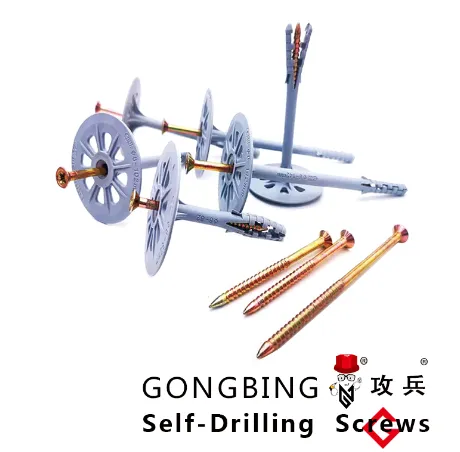Exploring the Versatility and Strength of Expansion Fasteners: Anchoring Solutions for Any Surface
In the world of construction and engineering, securing structures and fixtures to various substrates is a crucial aspect that requires precision, durability, and adaptability. Expansion fasteners, also known as expansion anchors, are one such innovative solution that has revolutionized the way we attach objects to concrete, brick, or stone. These versatile fasteners offer a reliable method of anchoring by leveraging the principle of expansion to create a secure and lasting bond. Let's delve deeper into the world of expansion fasteners, specifically focusing on expansion anchor plastic and expansion screw plastic, exploring their mechanisms, applications, and advantages.

Understanding the Basics of Expansion Anchors
At the heart of every expansion anchor lies a simple yet ingenious concept: the use of force to expand a component within a hole, thereby creating a tight and secure fit. Typically, an expansion anchor consists of two main parts: a sleeve (often made of metal or expansion anchor plastic) and an expansion bolt or screw. The installation process involves drilling a hole into the substrate, inserting the anchor, and then tightening the bolt or screw. As the bolt is tightened, it pulls a cone-shaped or threaded expander within the sleeve, causing it to expand radially and grip the walls of the hole.
Expanding screws, a specific type of expansion anchor, incorporate the expansion mechanism directly into the screw's design. These screws feature a unique thread pattern or a split shank that expands when turned, effectively anchoring the screw in place.
The Advantages of Expansion Anchor Plastic
Expansion anchor plastic has emerged as a popular material choice due to its unique blend of properties. Firstly, plastic anchors are lightweight, making them easier to handle and install, especially in hard-to-reach or overhead locations. They also offer excellent corrosion resistance, an essential feature in environments exposed to moisture or chemicals. Plastic anchors are ideal for applications where non-conductive materials are required, such as electrical installations.
Moreover, the use of plastic in expansion anchors can reduce installation time and cost. Plastic anchors can often be installed without pre-drilling, eliminating the need for separate hole-making tools. Additionally, their self-tapping design ensures a snug fit without damaging the surrounding material, making them ideal for use in delicate or fragile substrates.
Applications of Expansion Fasteners
- Expansion fastenersfind their way into a wide range of industries and applications, including:
- Construction: From hanging signboards and awnings to securing structural beams and columns, expansion anchorsprovide a strong and reliable connection to concrete and masonry walls.
- Industrial Equipment: Heavy machinery and industrial equipment often require secure anchoring to prevent movement or accidental displacement. Expansion fasteners offer a robust solution for these demanding applications.
- Electrical and Plumbing: In electrical installations, plastic expansion anchorsensure that conduits, outlet boxes, and fixtures are safely and securely mounted without the risk of electrical short circuits. Similarly, in plumbing, they anchor pipes, fittings, and fixtures to walls and floors.
- Outdoor Structures: For decking, fencing, and other outdoor structures, expansion fastenersprovide a durable anchoring solution that can withstand weather extremes and changing temperatures.
Choosing the Right Expansion Fastener
Selecting the appropriate expansion fastener for a given application involves several considerations, including:
- Substrate Type: Different substrates require different types of anchors. For instance, softer materials like drywall may not withstand the expansion force of metal anchors, making plastic anchors a more suitable choice.
- Load Requirements: The intended load on the anchor must be carefully assessed to ensure that the selected anchor can withstand the forces applied.
- Environmental Factors: Exposure to moisture, chemicals, or extreme temperatures can affect the performance of expansion fasteners. Choosing materials that are resistant to these factors is crucial.
- Installation Considerations: Ease of installation, including the need for pre-drilling and the availability of specialized tools, can impact the choice of expansion fastener.
In conclusion, expansion fasteners and specifically expansion anchors, including expansion anchor plastic and expansion screw plastic, are invaluable tools in the construction and engineering industries. They offer a versatile, reliable, and cost-effective solution for anchoring objects to a wide range of substrates. By leveraging the power of expansion, these fasteners create a secure and lasting bond, ensuring that structures and fixtures remain firmly in place. As technology continues to evolve, so too will the design and capabilities of expansion fasteners, making them even more efficient and adaptable to the ever-changing demands of modern construction and engineering.
-
Weatherproof Plastic Expansion Anchors for OutdoorNewsJun.06,2025
-
Sustainability in the Supply Chain: Eco-Friendly TEK Screws ProductionNewsJun.06,2025
-
Load-Bearing Capacity of External Insulation FixingsNewsJun.06,2025
-
Double Head Bolts: Enhancing Efficiency in Industrial MachineryNewsJun.06,2025
-
Corrosion Resistance in Chipboard Screws: Coatings for Wholesale DurabilityNewsJun.06,2025
-
Butterfly Toggle Bolts : Enhancing Structural ResilienceNewsJun.06,2025
